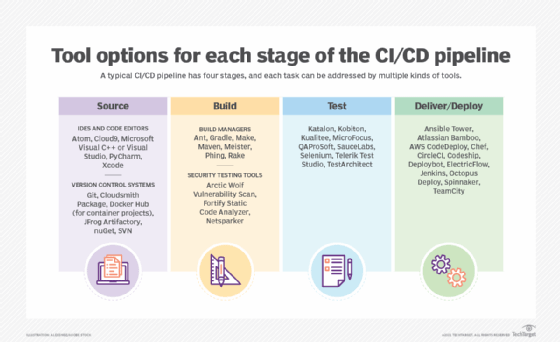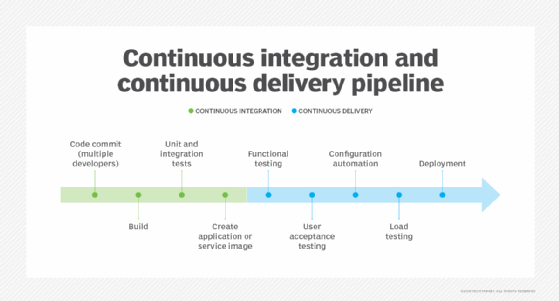Top 10 Jenkins alternatives
Tired of the overhead of hosting your own Jenkins installation and looking for some alternatives? Here are 10 of the best.
You're looking for a Jenkins alternative? That's a big ask.
Jenkins is one of the most popular continuous integration and continuous delivery tools on the market today, and while nobody would assert that it's the perfect CI/CD tool, finding a replacement with an equivalent feature list is a tall order.
However, this segment of the DevOps industry is ripe with competitors. Here are the top 10 Jenkins alternatives you should investigate if you're interested in moving away from Jenkins:
- GitLab.
- Atlassian Bamboo.
- GitHub Actions.
- Cloudomation.
- Spinnaker.
- CircleCI.
- TeamCity.
- Azure DevOps.
- Maven & Gradle.
- CloudBees.
GitLab as a Jenkins alternative
Despite the first three letters of the name, GitLab is more than just a cloud-based, distributed version control system based on Git. GitLab also provides a full suite of open source, on-premises tools that enable the development of continuous integration and deployment pipelines.
Long before GitHub released its GitHub Actions CI/CD offering, GitLab provided users with innovative ways to continuously build code as it's checked into GitLab repositories and deploy code as it passed quality gates.
GitLab is a leader in the DevOps space, and anyone looking for an alternative to Jenkins should check out both its locally managed open source tools and cloud-based offerings.
Atlassian Bamboo
Bamboo is Atlassian's highly customizable continuous integration tool that is comparable to Jenkins, in that it is distributed as locally installable software with which organizations can manage their CI/CD builds on in-house servers.
Atlassian also has a complete cloud-based DevOps pipeline service, so if users want to move away from Bamboo and into the cloud with their BitBucket Git repositories, that option is available.
GitHub Actions
Since the Microsoft acquisition, a variety of new features have been added to the popular, cloud-based Git and GitHub offering, and GitHub Actions is one of the most popular.
With GitHub Actions, developers write scripts that pull code from a GitHub repository, compile their code and build artifacts on lightweight containers, then deploy those applications directly onto production servers.
Relatively new to the CI/CD space, GitHub Actions has had to play catch-up with vendors such as GitLab that have been in this space for longer, but currently the core GitHub feature set is on par with competitors in the market.
If your code is already hosted in a GitHub repo, entertaining GitHub Actions as a Jenkins alternative makes a lot of sense.

Cloudomation
Jenkins is written in Java and Jenkins shared libraries are commonly written in the JVM language Groovy. But what if you want a break from Java?
Cloudomation is a build automation tool that enables developers to write scripted pipelines in Python, a language commonly preferred to perform simple automations or glue multiple automations together.
Capable of integrating with any Git offering, Cloudomation is a viable Jenkins alternative, especially for teams that want to build their CI/CD pipelines in Python.
Spinnaker
Netflix is a long-cited reference case for DevOps done right, and the company has open sourced many in-house development tools to help others pursue their own DevOps journeys. One of these tools is Spinnaker, a continuous delivery tool now backed by Google, Amazon, Microsoft and others.
Netflix is heavily vested in the cloud-native approach to application development and delivery. Spinnaker reflects that approach through integrations with cloud and container hosting technologies including Docker, Kubernetes, VMware and Amazon EC2. Spinnaker is a proven cloud-native CD tool that can serve as a Jenkins alternative for some CD functionality to support a cloud-focused approach.
Note that Spinnaker only addresses the continuous delivery side of a CI/CD pipeline, so you'll need to add a CI component. If you're satisfied with Jenkins' CI capabilities but need a separate CD tool set, integrate the two together for a full CI/CD pipeline.
CircleCI
CircleCI is an independent vendor that focuses on simplifying the build process for organizations.
CircleCI is known for its ease of use and simplicity, along with its support for multiple build environments from Windows to Linux to macOS. Both cloud-hosted and on-premises options are available, and a vast ecosystem of plugins and integration points enables CircleCI to work with any Git-based repository and integrate with a wide range of deployment targets.
TeamCity
The foundation of any automated build pipeline is the code software developers write, which is why TeamCity is a great choice for organizations that put developers first.
JetBrains, the vendor behind popular IDEs IntelliJ and PyCharm, also offers TeamCity for continuous integration. JetBrains has expertise on how to keep developers productive, and TeamCity extends that knowledge into the release management field.

Azure DevOps
In the same way there are benefits for GitHub users to run their automated builds with GitHub Actions, Azure users can choose Microsoft's Azure DevOps Server (formerly Team Foundation Server) to manage software deployments to Microsoft's cloud.
Historically, organizations that worked with Java EE or Jakarta EE applications were unlikely to investigate Microsoft-based products such as .NET technologies. However, in the past few years Microsoft has embraced the Java community -- it acquired JClarity, recruited former Java Champions and Java EE evangelists from Oracle, and most significantly released its own version of the OpenJDK runtime.
Furthermore, Azure's support for Docker and Kubernetes eliminates the difficulties associated with deploying Java-based apps to the Microsoft cloud.
For Azure users, or for those that manage applications written in both Java and .NET, Azure DevOps Server could be a compelling Jenkins alternative.
Roll your own with Maven and Gradle
If a team seeks a Jenkins alternative because it feels the tool is too complex, or its automated builds require significant customizations, another option is to build your own continuous integration server with Apache Maven or Gradle.
Maven provides a comprehensive set of build, test and deploy tools. It offers built-in facilities to package applications, not only as Java-based artifacts such as EAR, JAR and WAR files but also as Docker images that teams can test and deploy into a Kubernetes cluster.
With the Gradle API, Java developers can schedule tasks, monitor deployments and interact with external systems. If none of the other Jenkins alternatives in this list fit your needs, and you have access to talented software developers who understand your automated build needs, the best Jenkins alternative might just be the one you build on your own.
CloudBees CI for a new spin on Jenkins
An organization that uses open source Jenkins may not need a Jenkins alternative so much as an extended version of the tool with professional support.
For those who want to expand their CI efforts, but not abandon Jenkins, consider CloudBees CI (formerly CloudBees Core). This self-service continuous integration server provides both on-premises and cloud-based options, supports rapid onboarding and can scale across many development teams.
If an organization wants to use Jenkins but with professional support, CloudBees CI might be the right choice.
A continuous integration server is a key component of the modern DevOps stack. Choose the one that best suits your needs -- whether it is Jenkins or another option-- and enjoy the digital transformation that ensues.
Cameron McKenzie has been a Java EE software engineer for 20 years. His current specialties include Agile development; DevOps; Spring; and container-based technologies such as Docker, Swarm and Kubernetes.








